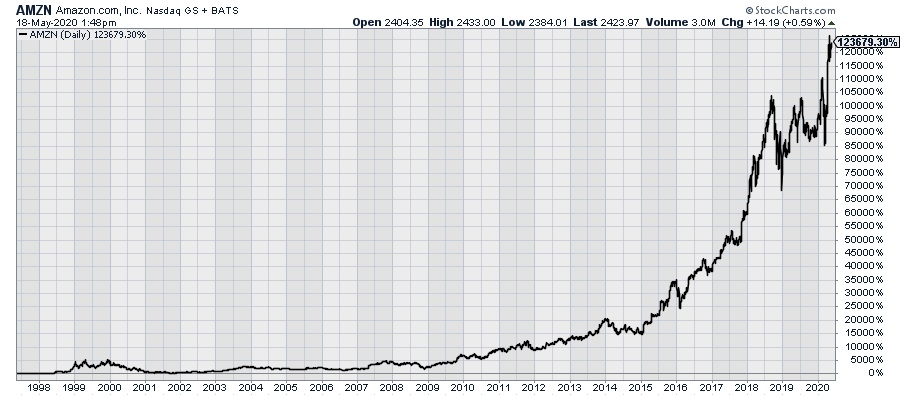Jeff Bezos could become the founding member of the “Four Comma Club”
Recently, one of my favorite financial writers, Barbara Kollmeyer of MarketWatch, wondered if Jeff Bezos could become the world’s first trillionaire.
It’s not so outlandish a thought. The CEO of Amazon is already one-seventh of the way there. To grow your fortune by sevenfold over the next 20 years would require an average annual return of just over 10.2%… Chump change given Amazon’s incredible track record!
A century ago, John D. Rockefeller was 77 when he became the world’s first confirmed billionaire. Bezos is only 56 years old, and I think we can assume he has better healthcare than most folks. So why not a trillionaire?
Since Rockefeller’s day, more than 2,000 Americans have joined the “Three Comma Club,” so named after the number of commas required to type $1,000,000,000. Ironically, Rockefeller saw a major surge to his wealth after the government decided to break up his company. In 1911, the Supreme Court ruled against Standard Oil and U.S. government broke the company up into several smaller companies.
Once separated, the new companies soared in value and the windfall brought Rockefeller’s fortune to over $1 billion. By the way, one of the new companies was Standard Oil of New Jersey, which renamed itself Exxon in 1973. Thanks to the coronavirus, Exxon and other energy stocks have fallen on hard times. Shakespeare sure was right when he wrote of “The slings and arrows of outrageous fortune…”
But as to Mr. Bezos, Amazon seems to be as strong as ever. The online warehouse has been a popular resource for folks stuck at home during the pandemic. Through Monday, shares of Amazon were up more than 31% this year.
Since the S&P 500 is a cap-weighted index, the aggregate numbers tend to distort how truly painful the bear market has been. Consider that nearly half the stocks in the S&P 500 are still down over 20% this year, and many more face a bleak future.
Amazon’s Amazing Track Record
Amazon’s stock IPO’d almost exactly 23 years ago, on May 15, 1997. The offering price was $18 per share. But would people really buy books off the Internet?
Apparently so. Since then, Borders has gone bankrupt and Barnes & Noble has been taken private. Of course, Amazon is a lot more than books these days. In fact, Amazon has completely upended the world of retail. Several retailers have gone out of business thanks to Amazon.

On average, Amazon has gained, roughly 1% every 11.4 days for 23 straight years. Last Friday, Amazon closed at $2,409.78 per share. Now let’s break out some math. That figure doesn’t include three stock splits totaling 12-for-1. In 1997 terms, one share of Amazon is now worth more than $28,900—meaning Amazon has gained 1,600-fold in 23 years. If you had invested $6,300 with Mr. Bezos in 1997, today you’d been sitting on a cool $10 million. Not bad for a website.
Of course, that simplified story leaves out Mr. Bezos watching his fortune plunge by 95% during the bursting of the Dotcom Bubble in 2000-01. A 95% drop is watching your stock fall by 90%… and then watching what you’re left with fall in half.
Could you have watched your life savings plunge so drastically and carry on? I don’t know if I could, but Bezos did, and his stock more than rallied back.
We have to remember how crazy things were during the late 90s. In 1998, Henry Blodget, then a star analyst at CIBC Oppenheimer, raised his price target on Amazon from $150 to $400 per share.
Wall Street was stunned. At the time, Amazon was at $242.75 per share. The Street was even more stunned when Amazon got to $400… three weeks later!
Of course, there are other candidates for first trillionaire. Mark Zuckerberg is 20 years younger than Bezos. The Google Guys, Sergey Brin and Larry Page, are both at $60 billion and they’re not that old, either. Of course, there’s also Elon Musk. Who knows what he might invent in the coming decades?
Or perhaps the first trillionaire hasn’t been born yet. Or it could be a young girl in rural China.
Only the future knows.





